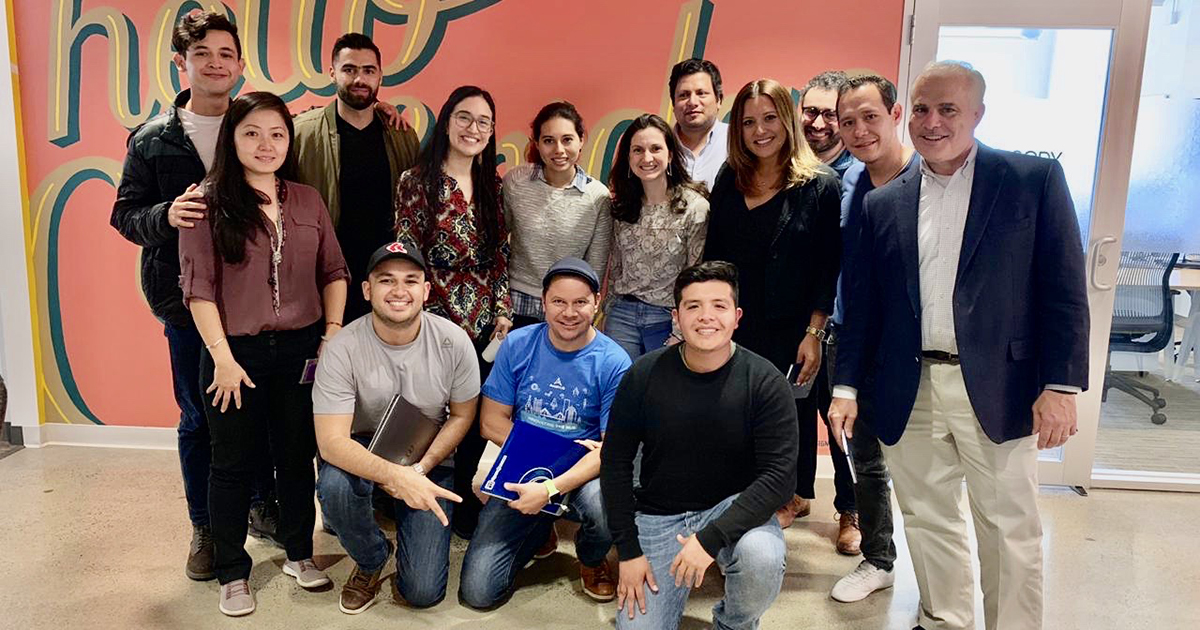Entrepreneurship with Law During COVID-19

Imagine being a job seeker, but not being free to accept an offer.
Imagine being an employer who’s not free to hire the most-qualified person.
Now imagine being an entrepreneur with a startup that will serve a community and hire local talent during the COVID-19 outbreak, but your legal status does not allow you to act.
Danielle Goldman, an alumna of the Babson Women Innovating Now (WIN) Lab®, has solutions. She launched Open Avenues Foundation (OAF) to help U.S. employers and the diverse global talent that generates positive outcomes for communities and for the American economy.
The COVID-19 outbreak and policy changes have increased the challenge for both U.S. employers in hiring their top-choice candidates and foreign entrepreneurs. OAF has found innovative ways to help while still respecting the intent and language of immigration policy.
“It’s incredibly scary,” said Goldman of the times we are in. “But, the potential outcomes for local companies, global talent, and U.S. society make it worth trying.”
Consistent with U.S. immigration laws, Goldman created opportunities for these candidates to work with students from Open Avenues’ partner universities. The five hours a week they work in OAF’s Global Talent Fellowship enables them to legally work for their full-time employer.
Now, Goldman has found a way to help aspiring foreign national entrepreneurs who want to stay and serve communities during the COVID-19 crisis by establishing the Social Innovation Incubator Program (SIIP).
I’m collecting stories like hers for a book, Extreme Entrepreneurship, so I recently spoke with her about these two initiatives and the impact of COVID-19 on international talent.
How would you frame the significance of what you are doing with OAF?
Buried within the economic and health crisis the country is facing due to COVID-19, our country is challenged with a new immigration crisis—one that significantly impacts international student graduates seeking employment or starting their own ventures. The impact could stymie the future of innovation and entrepreneurship in the U.S. that is driven by global talent.
We don’t hear debates about immigration law being framed as a matter of individual liberty–is it fair to frame this as a matter of freedom for U.S. employers to hire whom they want, and the freedom of talented and motivated people to contribute to the U.S. economy and society?
“Yes! It’s about their freedom to contribute through their work, or now, through setting up a new enterprise to help our local communities get through the COVID-19 crisis. We’ve invested in training these people through universities and colleges here. Now, we’ll lose them when they are about to help our local communities here in the USA?”
Are you working within the immigration system?
“We make sure to emphasize this is all innovation within the law and within the system. We are respecting the intent and language of what Congress voted upon and passed into law, which is a cap exemption (from the annual randomized lottery for visas) and process of granting visas outside the lottery cycle for those who do good for American society.”
Your story illustrates a theme of real-life cases and guest speakers in my classes this semester: that legal astuteness is a lens of strategy. Being familiar with the law can help us ask the right questions, and see opportunities that others miss. Anything you want to add to this point?
“Babson is an institution that believes in big ideas and fosters an environment for smart risk-taking. There are many people I met along the way who could not understand the concept of starting an organization in such a highly regulated space. Everyone I met through the Babson WIN Lab saw value in the mission of Open Avenues and the solution we developed. I am grateful for that type of reassurance, encouragement, and support, especially right now when the resilience of all entrepreneurs is being tested.”
What is your longer-term vision for the Social Innovation Incubator, and what is a specific example of what ideas may qualify?
“I see it potentially as an army of individual entrepreneurs who are working to create community benefits through social ventures. The first to join is a recent MIT graduate, Jasmine Qin, whose social enterprise is a platform providing better data and logistics support to frontline organizations and agencies working in disaster relief and epidemic response.”
How do you make revenue for the services that you are providing?
“Employers pay us for our service of promptly assuring the visa status for their desired workers through the Global Talent Fellowship program. They are often very certain, after experiencing the work ethic of a given employee, that no one else will be as good, so they know it is 100% worth it to pay for our service.
“In the case of our Social Innovation Incubator, as the fiscal sponsor, we receive 12% of grants that they will receive—and in exchange for that, we develop and support the social entrepreneur (whose idea we’ve already vetted and believe in) and pay them a part-time salary as they fundraise, and, as a local non-profit, we are the legal avenue (that otherwise would not exist to a foreign national) for applying for grants to help local communities.”
This piece was edited and adapted by Kait Lanthier from a post by Adam Sulkowski on Babson Blogs. The entire original piece is available on extreme-entreprenuership.com.



